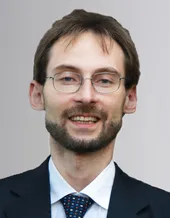Scientific Report on TUM-IAS Fellowship
The activities of our Focus Group are primarily centered on the interplay between geometry, machine learning, and computer vision. Analysis of geometric objects has been a topic of computer vision and pattern recognition since the inception of the field, and geometric principles of symmetry and invariance underpin the success of modern deep learning methods. full report …
Short CV
Michael Bronstein is a professor at USI Lugano, Switzerland and Imperial College London, UK where he holds the Chair in Machine Learning and Pattern Recognition. He is also a principal engineer at Intel Perceptual Computing. Michael got his Ph.D. with distinction in Computer Science from the Technion in 2007. He is a Fellow of IAPR, Senior Member of the IEEE, alumnus of the Technion Excellence Program and the Academy of Achievement, ACM Distinguished Speaker, and a member of the Young Academy of Europe. His research appeared in the international media such as CNN and was recognized by numerous prestigious awards, including several best paper awards, four ERC grants (Starting Grant 2012, Proof of Concept Grants 2016 and 2018, and Consolidator Grant 2016), two Google Faculty Research Award (2015, 2017), a Radcliffe Fellowship from the Institute for Advanced Study at Harvard University (2017), and Rudolf Diesel Industrial Fellowship from TU Munich (2017), the Amazon AWS Machine Learning Research Award (2018), a Dalle Molle Prize (2018), and a Royal Society Wolfson Merit Award (2018). In 2014, he was invited as a Young Scientist to the World Economic Forum, an honor bestowed on forty world's leading scientists under the age of forty. He was a guest speaker at the World Economic Forum meeting in Dalian, China in 2015. Michael is the author of the first book on deformable 3D shape analysis, editor of four books, over 100 papers in top scientific journals and conferences, and inventor of over 30 granted patents. He has chaired over a dozen of conferences and workshops in his field, and has served as area chair at ECCV 2016 and ICCV 2017 and as associate editor of IJCV, CVIU, and SIAM Imaging Sciences journals. In addition to academic work, Michael is an inventor and serial entrepreneur. He was a co-founder and technology executive at Novafora (2005-2009) developing large-scale video analysis methods, and one of the chief technologists at Invision (2009-2012) developing low-cost 3D sensors. Following the multi-million acquisition of Invision by Intel in 2012, Michael has been one of the key developers of the Intel RealSense technology. His most recent venture is Fabula AI, a startup dedicated to algorithmic detection of fake news. Just a year after incorporation it was aquired by Twitter in June 2019. Following the deal Michael joined Twitter as Head of Graph Learning Research.
Selected Awards
- 2018, Dalle Molle Prize
- 2018, Royal Society Wolfson Research Merit Award
- 2018, ERC Proof of Concept Grant
- 2018, Amazon AWS Machine Learning Research Award
- 2018, Fellow, International Association for Pattern Recognition (IAPR)
- 2017, Google Faculty Research Award
- 2017, Radcliffe fellowship, Harvard University
- 2017, Rudolf Diesel industrial fellowship, TU Munich
- 2016, ERC Consolidator Grant 2016 ERC Proof of Concept Grant
- 2016, Best Paper Award, Symposium on Geometry Processing
- 2016, Google Faculty Research Award
- 2015, Intel High Five Award
- 2015, ACM Distinguished Speaker
- 2015, Elected member, Global Young Academy
- 2015, Elected member, Young Academy of Europe
- 2014, World Economic Forum Young Scientist
- 2012, EUROGRAPHICS Service Award
- 2012, ERC Starting Grant
- 2005, Adams Fellowship
- 2005, Best Paper Award, Copper Mountain Conference on Multigrid Methods
- 2003, Hershel Rich Technion Innovation Award
- 2003, Gensler Prize
- 2003, Honorary Student Delegate, International Achievement Summit
- 2002, Alumnus, Technion Excellence Program
- 2002, Kasher Prize for best undergraduate project
- 2002, Thomas Schwartz Award for best undergraduate project
- 2001, Technion Humanities and Arts Department prize
Research Interests
• Theoretical and computational methods in spectral and metric geometry and their application to problems in computer vision, pattern recognition, shape analysis, computer graphics, image processing, and machine learning
• Deep learning on non-Euclidean structured data (graphs and manifolds)
Selected Publications
- F. Monti, D. Boscaini, J. Masci, E. Rodolà, M. M. Bronstein: Geometric deep learning on graphs and manifolds using mixture model CNNs. Proc. Computer Vision and Pattern Recognition (CVPR), 2017.
- Litany, O.; Rodolà, E.; Bronstein, A. M.; Bronstein, M. M.; Cremers, D.: Non-Rigid Puzzles. Computer Graphics Forum 35 (5), 2016, 135-143.
- Boscaini, D.; Masci, J.; Rodolà, E.; Bronstein, M. M.; Cremers, D.: Anisotropic Diffusion Descriptors. Computer Graphics Forum 35 (2), 2016, 431-441.
- Rodolà, E.; Cosmo, L.; Bronstein, M. M.; Torsello, A.; Cremers, D.: Partial Functional Correspondence. Computer Graphics Forum 36 (1), 2016, 222-236.
- D. Boscaini, J. Masci, E. Rodolà, M. M. Bronstein: Learning shape correspondence with anisotropic convolutional neural networks. Proc. Neural Information Processing Systems (NIPS), 2016.
- A. Kovnatsky, K. Glashoff, M. M. Bronstein: MADMM: a generic algorithm for non-smooth optimization on manifolds. Proc. European Conf. Computer Vision (ECCV), 2016.
- Boscaini, Davide; Eynard, Davide; Kourounis, Drosos; Bronstein, Michael M.: Shape-from-Operator: Recovering Shapes from Intrinsic Operators. Computer Graphics Forum 34 (2), 2015, 265-274.
- D. Eynard, A. Kovnatsky, M. M. Bronstein, K. Glashoff, A. M. Bronstein: Multimodal manifold analysis using simultaneous diagonalization of Laplacians. IEEE Trans. Pattern Analysis and Machine Intelligence (PAMI), 2015, 2505-2517.
- D. Boscaini, J. Masci, S. Melzi, M. M. Bronstein, U. Castellani, P. Vandergheynst: Learning class-specific descriptors for deformable shapes using localized spectral convolutional networks. Computer Graphics Forum, 2015, 13-23.
- J. Masci, D. Boscaini, M. M. Bronstein, P. Vandergheynst: Geodesic convolutional neural networks on Riemannian manifolds. Proc. Workshop on 3D Representation and Recognition (3dRR), 2015.
Publications as TUM-IAS-Fellow
